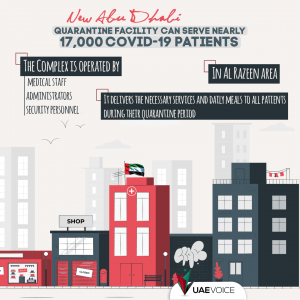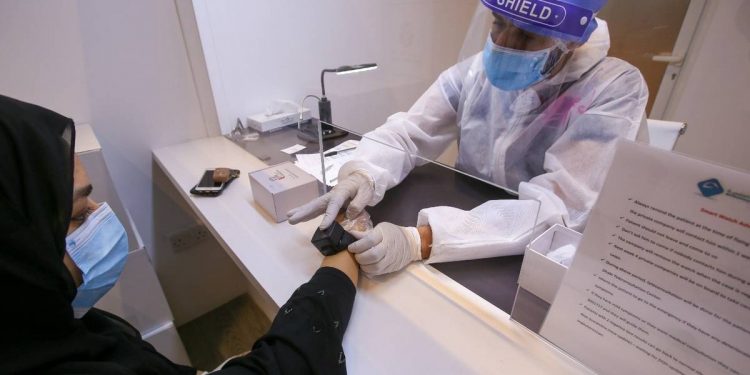The Ministry of Health and Prevention in the United Arab Emirates and its new quarantine facility announced on Sunday 540 new cases of infection, “COVID-19” and 745 cases of recovery. One death has also been reported from the injury. The ministry said that more than 44,000 new tests were performed for COVID-19. The ministry wished for a speedy recovery for all patients, calling on the public to adhere to the established preventive measures and follow all necessary medical advice to avoid further injuries. The UAE government announced on Saturday that its health entities have passed a new phase of 2.5 million COVID-19 tests in the country, the highest in the world. With more cases recovering from new cases in the country, the number of active cases in the UAE has decreased over the past two days and now stands at 16,932.
The new quarantine facility in Abu Dhabi
New quarantine can serve approximately 17,000 Covid-19 patients

A new quarantine facility has been established in the Al-Razain area of Abu Dhabi, which can accommodate approximately 17,000 COVID-19 patients, including Phase IV, which is equipped in record time and can accommodate 9,894 patients. The Abu Dhabi Media Office said that Al-Razeen Health Complex is managed by medical and administrative staff and security personnel, and provides necessary services and daily meals for all patients during the new quarantine period. Dr. Bartha Banerjee, CEO of Al Mazroui Medical Center who heads patient management in these facilities, said that there are two quarantine facilities in Al-Razeen. Dr. Banerjee, who also runs a 205-bed field hospital in Al-Razin city, said: “Al-Razain 4 has more than 9809 beds and Al-Razeen 2 is about 7000 beds. We have been managing these facilities for the past three weeks. ” Faisal Al Kamali, Vice President – Facilities and Infrastructure Department of the Ministry of Health and Prevention (Mohap), said that the new stage contains 2,784 rooms.
Smart devices monitor self-isolation
Smart wristbands to monitor self-isolation in Abu Dhabi
The smartwatch is used to monitor and track COVID-19 patients in Abu Dhabi under self-quarantine in homes. The electronic wrist device, launched by the Abu Dhabi Health Department, functions as a tracking and monitoring tool. The device will use patients who are asymptomatic or who have mild symptoms without risk factors and do not need hospitalization, which is associated with COVID-19 testing and tracking application, AlHosn. The tape was fixed to the arms of Covid-19 patients, whom health authorities allowed to isolate themselves. Doctors between 18 and 59 years old who have met a set of criteria can allow doctors to self-quit at home. The patient must meet the standards and regulations of the Isolation Department and the Public Health Department of the Abu Dhabi Center for Public Health, according to the authorities.
Recycled water in the UAE is free of COVID-19: research
New research has shown that treated wastewater in the United Arab Emirates is free of COVID-19 and can be used safely in irrigation and municipal distribution. A team of Khalifa University of Science and Technology (KU) experts said they could not detect the COVID-19 virus in any of the treated wastewater samples from three different plants across three emirates. Researchers have monitored the presence of the virus in wastewater because they believe this will be a good indicator of the number of infected people in the population. They said this method could help not only track the spread of COVID-19 but also early detection. Through their recent study – conducted in cooperation with the Abu Dhabi Energy Department (DoE) and other partners – experts found that wastewater treatment operations effectively disrupt the virus.
Fewer cases of child abuse have been reported in Sharjah
Amina Al-Rifai, Director of the Child Protection Department at the Social Services Department in Sharjah, revealed a noticeable decrease in the cases of violence and child abuse that were reported during the COVID-19 period. She was addressing an online seminar entitled “Stop Violence against Children” attended by 450 child protection experts. Al-Rifai said that reports of violence and abuse against children on the department’s hotline fell dramatically during COVID-19 in April and May. She added that the 24-hour Children’s Helpline (800,700) received about 166 reports in April and May compared to the three months (January, February, and March) before the COVID-19 Crisis, where about 401 reports were received. Al-Rifai attributed the decline in reports to the fact that during the COVID-19 period, parents were staying with their children at home, and they are close to them, which increases family bonding, and does not leave the child home, which also reduces the possibility of being at risk.





